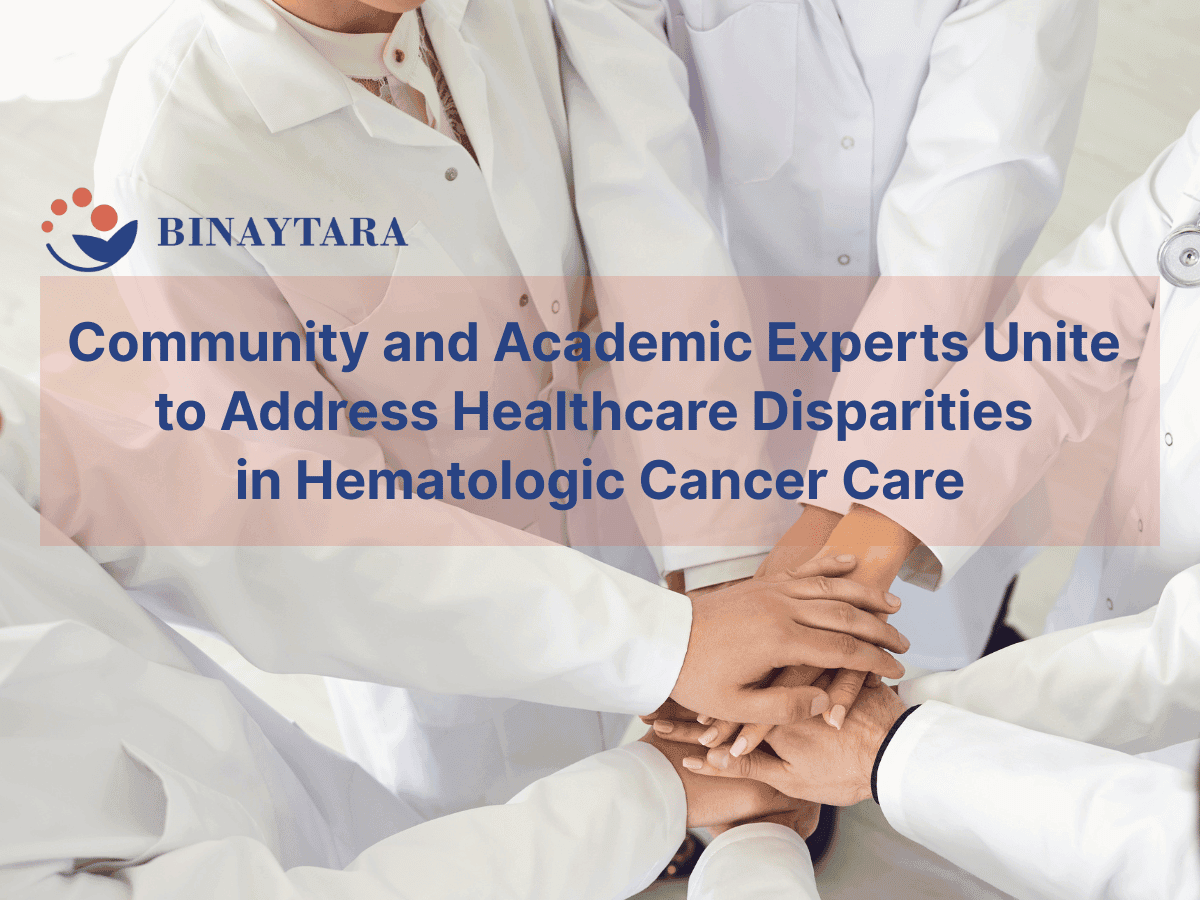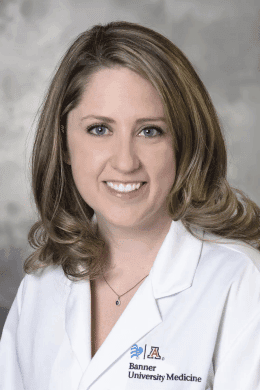Community and Academic Experts Unite to Address Healthcare Disparities in Hematologic Cancer Care

Author
Binaytara Team
An article based on this interview was published on VCU Massey Cancer Center News
Dr. Keri Maher, a hematologist/oncologist at Virginia Commonwealth University (VCU) Health, co-chairs the Virginia Hematology Conference: Practical Perspectives in Patient-Centered Care in Richmond, Virginia.
At this conference, experienced faculty members, clinicians, and researchers convene to faculty to deliver case-based discussions and practical updates in hematologic care. The focus is on making the latest advances from leading hematology research accessible and actionable for community-based providers.
Highlight of the Interview
Personal Mission Rooted in Experience
Dr. Keri Maher’s passion for addressing healthcare disparities stems from her upbringing in a rural area and the loss of her high school sweetheart to AML. These early experiences shaped her career in leukemia research and access-focused care.
Building Rural Cancer Care Networks
Dr. Maher is leading efforts to create the Acute Leukemia Virginia Consortium, partnering with the University of Virginia (UVA) and VCU to bring clinical trial access, education, and specialist support to rural communities across the mid-Atlantic region.
Uniting Clinicians for Change at Binaytara Conference
As co-chair of the Binaytara conference, Dr. Maher sees this platform as key to connecting academic and community practitioners, sharing knowledge, and advancing her mission of equitable cancer care.
The Interview
Question | Binaytara: Can you introduce yourself and tell us about your role?
Answer | Dr. Maher:
“I am Keri Maher, an associate professor of medicine at Virginia Commonwealth University Comprehensive Cancer Center, where I serve as the director of the acute leukemia program. I oversee both medical and research operations as a clinical translational scientist, with a specific focus on clinical trial design and implementation in leukemias. Within that scope, I particularly concentrate on healthcare disparities and access to healthcare issues.”
Q: You mentioned working on numerous clinical trials. Can you share details about a recent trial you are leading?
A:
“Right now I have 10 open trials, and I have had 31 in the past five years. The ones I am most excited about are my investigator-initiated trials (IITs), specifically the REMAIN Series, which stands for Reimagining Maintenance Therapies in Transplant Eligible AML.
AML is a disease with an overall pretty poor prognosis; the five-year overall survival in adults is about 30%. Most of these patients are recommended for bone marrow transplant if they reach remission, which is our curative intent paradigm. Unfortunately, many patients who are underserved or have social determinant health issues can't access a transplant due to a lack of donor, social support, proper insurance, or other barriers.
My trials specifically target this population to improve overall survival in patients who should have gone to transplant but were not able to. This is a population of AML patients for whom there are simply no trials available. REMAIN-1 is currently open and accruing patients, looking at oral azacitidine maintenance in this molecular-agnostic acute myeloid leukemia population. REMAIN-2 has received pharmaceutical funding and is going through FDA approval.”
Q: What drives your passion for addressing healthcare disparities?
A:
“This goes deep. My interest in healthcare disparities started before I even understood healthcare. I grew up in a really rural place, 45 minutes to the nearest hospital, two and a half hours to the nearest academic hospital. No one went to college. It was farm country.
My high school sweetheart got diagnosed with AML while we were in college. He ended up passing away due to healthcare access issues. He went to our local community hospital, which was still a 45-minute drive, but they didn't know how to manage him. Long story short, it ended very poorly. From that experience, I decided I would go fix this problem, which includes research in AML and improvement in access issues.
As I matured in my career, I saw patient after patient that I could not get to transplant, and then I had to watch them relapse and pass away. That's why this specific population is where I focus.”
Q: What progress have you seen in addressing these access issues?
A:
“It has gotten better. The access issues still exist, but I think part of the solution is being a bridge. You are not going to have an academic medical center in rural Virginia, but what you can do is provide education and outreach from wherever your center is.
I am working on building an acute leukemia Virginia Consortium with partners like UVA and VCU across all major regions in Virginia. Once established, I want to spread it to the mid-Atlantic. The goal is that patients can receive comprehensive cancer center-level care in whatever small community they live in, equalizing access issues.”
Q: How does this consortium model work practically?
A:
“It is both a referral system and bringing services directly to communities. We need to educate physicians and patients in these communities. As subspecialists, we are very ‘pointy’, meaning we are extremely good at this one specific thing, whereas community oncologists have to be good at everything but are not as specialized.
To get subspecialty-level care out to rural communities, community oncologists can partner directly with us to give their patients the level of care they would get at a comprehensive cancer center. This includes bringing clinical trials to these sites, which means designing trials that can be implemented at rural locations without intensive monitoring requirements.”
Q: You are co-chairing a Binaytara conference. What draws you to this opportunity?
A:
“When I heard about this conference, I realized it is exactly what I do. It aligns perfectly with my goals. This is a formal educational event that brings folks from different areas and arenas, with different practice styles and focuses, all into the same room. We can have discussions together, increase knowledge by talking with each other, find out what community assets they have, and identify what they might be lacking, so we can partner better.”
Q: What motivates you in this work?
A:
“For me, this is not a job. This is a calling, this is my life's work. I honestly couldn't be happier. I'm blessed to be here and to be able to work on solving these problems that I have seen firsthand affect so many patients and families.”
About Dr. Keri Maher

Dr. Keri Maher is a hematologist-oncologist and health equity leader advancing access to leukemia care through research, education, and rural clinical integration. She is the director of the Acute Leukemia Program at Virginia Commonwealth University (VCU) Comprehensive Cancer Center, where she leads initiatives to expand clinical trial access and develop innovative maintenance therapies for underserved AML patients. As co-chair of the Virginia Hematology Conference and Binaytara’s Practical Perspectives in Patient-Centered Care, Dr. Maher is building collaborative networks that bring subspecialty-level cancer care to rural and community settings across the mid-Atlantic.
Learn with Us and Drive Meaningful Impact
As a leader in global oncology, Binaytara organizes over 50 CME/ACPE-accredited conferences annually to share the latest updates in hematology and oncology while addressing critical issues in cancer health disparities. All our CME conferences are multidisciplinary and are designed for physicians, advanced practice providers, pharmacists, nurses, and other healthcare professionals committed to advancing cancer care. We strongly believe that targeted CME and cross-institutional collaboration are essential to expanding the reach and impact of novel cancer treatments. Learn more about upcoming regional and national hematology/oncology conferences and initiatives at the Binaytara Education Academy.